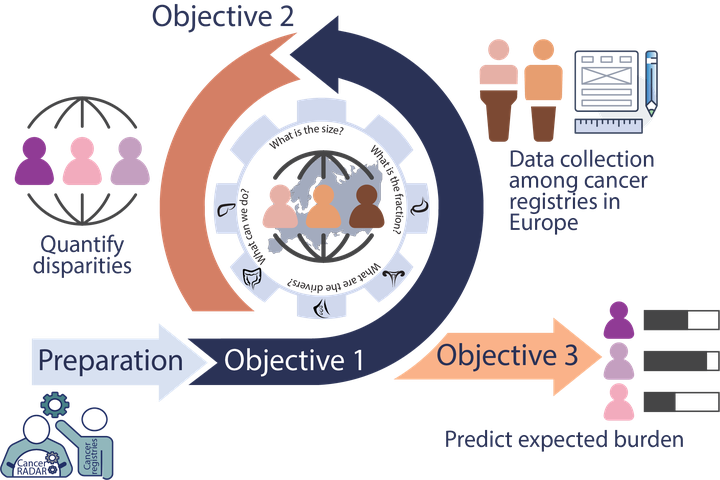Migration to and within Europe has increased and diversified in recent years. Individuals with a migration background often have health needs that differ from the host population of a country. At the same time they can face important barriers to access the right health care. A unified quantification of current disparities of cancer by migration background in Europe does not exist impeding policy makers to act upon the health needs of migrants. To fill this knowledge gap Cancer RADAR’s aim is to develop an infrastructure that allows quantifying the risk of cancer by migration background across Europe. To establish this, Cancer RADAR will first focus on infection-related cancers (liver, stomach, and cervical cancer) and screening preventable cancers (breast, cervical, and colorectal cancer).

The overarching aim of Cancer RADAR is to provide a Europe-wide quantification of the current disparities and future expected burden of infection-related and screening preventable cancers among individuals with a migration background and translate these findings into action together with stakeholders. Click here to see a video with a detailed description of the project.
Objective 1 – Collect and synthesize: collect data on infection-related and screening preventable cancers stratified by migration background from cancer registries across Europe by developing a flexible data collection tool to integrate various aggregated data sources and context-specific co-variables.
Objective 2 - Quantify and contextualize: quantify infection-related and screening preventable cancer risks and disparities among migrants stratified by host-country and identify drivers of disparities.
Objective 3 – Predict and act: estimate the future expected and preventable burden of infection-related and screening preventable cancer cases among migrants in several key European countries to identify whether the largest health gains can be made through e.g. general or migrant-targeted prevention programs.
This initiative is a collaboration between Amsterdam UMC, IARC-WHO, IACR, and cancer registries across Europe and is currently funded by VENI ZonMw grant.
